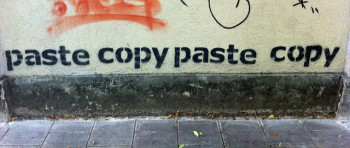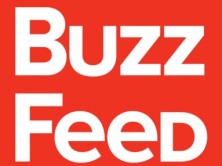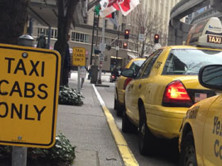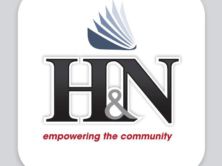
The article in question addressed a recent PCC violation that the Sunday World violated a woman's privacy by showing a photo of her sunbathing topless (Credit: Credit: Wiredforlego via Flickr)
The Press Gazette lifted verbatim content from a Press Complaints Commission ruling in January, iMediaEthics discovered.
Press Gazette is a UK journalism news site.
When iMediaEthics asked Press Gazette editor Dominic Ponsford about the verbatim content, he denied it was plagiarism. But, after several e-mail exchanges with iMediaEthics providing evidence of improper use of PCC content, Ponsford finally conceded the Press Gazette should have done a better job with attribution.
“You are right that we should have made more effort to either rewrite in our own words or quote directly with attribution,” Ponsford told iMediaEthics.
iMediaEthics first spotted the problems with the Jan. 13 Press Gazette story when researching our January story about the same PCC ruling on a woman named June McKibbin‘s complaints against the Sunday World.
Bottom line: the Press Gazette copied and pasted extensive word-for-word text from the PCC ruling without using any quotation marks to indicate the original authorship. The byline for the article simply reads: “Press Gazette.”
See an example below of how Press Gazette lifted word-for-word without quotation marks:
PCC: “The complainant explained that this was a private photograph, taken whilst she was on holiday with Ms Fitchie a number of years ago, which had gone missing while being stored at a friend’s house in the late nineties.”
Press Gazette: “McKibbin said that this was a private photograph, taken whilst she was on holiday with Fitchie a number of years ago, which disappeared while stored at a friend’s house in the late 1990s.”
iMediaEthics exchanged nine e-mails over several weeks with Press Gazette editor Ponsford about the Press Gazette article (five from us and four from Ponsford).
At first, in a Jan. 23 e-mail to iMediaEthics, Ponsford defended the Press Gazette’s report and argued its lack of attribution was OK because the PCC report was a press release. “PCC judgments are sent to us as press releases by the PCC with the implied understanding that we can quote from them as we wish,” he wrote. “So I don’t think it is correct to describe our report as plagiarism. The PCC is a regulator, not a publication.”
“I think you are barking up the wrong tree to describe this as plagiarism,” he added.
The problem is, the Press Gazette didn’t actually use quotation marks around verbatim content. iMediaEthics’ side-by-side comparison of the Press Gazette’s article with the Press Complaints Commission’s report found a mix of:
- Word-for-word copy and pasting from the PCC without any quotation or attribution
- Slight re-wording of the PCC’s language, which suggests the Press Gazette writer was trying to make the work his or her own
- Clearly marked quotations from the PCC report.
Also, Ponsford’s claim that the PCC report was a press release is a red herring. Not only was the PCC report not a press release, it was a judgment. It does not matter if it’s a press release, book, article or an email from someone else to you, if you copy and paste the words belonging to others without indicating the words are not your own, it is plagiarism.
The PCC had no comment when iMediaEthics asked about the Press Gazette’s lifting of its work, but did confirm that the report in question was a ruling, and not a press release.
iMediaEthics responded to Ponsford, pointing out that even if the PCC report in question were a press release (which it’s not), it still is plagiarism to take word-for-word content from another writer.
Below, see a highlighted mark-up of the original version of Press Gazette report. We highlighted content verbatim from the PCC.

iMediaEthics highlighted the above images of the Press Gazette story to compare it to the PCC ruling. Yellow highlight indicates verbatim content from the PCC. Bracketed in red is information from the PCC that was properly attributed. (Credit: Press Gazette, screenshots, highlight and red pen added)
Ponsford then conceded the article needed “better attribution.”
Did Press Gazette fix the attribution?
While Ponsford did go back into the story and add more references to the information coming from a PCC judgment after iMediaEthics contacted him, verbatim text from the PCC ruling continues in their report without quotation marks.
So iMediaEthics flagged this fact again to Ponsford asking him if they would be adding quotation marks around copied and pasted text from the PCC ruling.
While Ponsford ultimately didn’t add them, he did admit that the Press Gazette lifted “some phrases” from the PCC.
“Think I have devoted as much time as I can to this,” he wrote to iMediaEthics. But he acknowledged, “You are right that there are some phrases in the PG report which also appear in the PCC judgment.”
Ponsford continued: “I would just say that PCC judgments are sent to as press releases and on this occasion you are right that we should have made more effort to either rewrite in our own words or quote directly with attribution.”
Was it Churnalism? What an expert says
iMediaEthics reached out to an expert in plagiarism and attribution in the UK to ask about the assertion that it was okay to copy and paste from press releases without attribution.
We emailed the Media Standards Trust, a UK charity concerned with ethical practices in journalism, if it would be more acceptable to copy and paste from a press release than from a PCC ruling.
The trust’s director Martin Moore told iMediaEthics that he didn’t see any difference between needing to properly attribute to a press release versus a news ruling.
He also pointed to the trust’s Churnalism tool that readers can use to determine if a news story is a press release in disguise.
Churnalism is a project of the trust. The term itself is defined as “a news article that is published as journalism, but is essentially a press release without much added.” It allows users to determine how much of a news article is taken from a press release.
Moore explained:
“One of the reasons we built churnalism.com was because we felt it was wrong to copy and paste text verbatim, without quote marks and without attribution. Especially when it’s now so straightforward to link to source. Whether it’s a press release, wire copy, or another news report, then we’ve always said that transparency is the best policy.
“Sadly, many news outlets still do copy and paste lots of text, without attribution (or without adequate attribution). Which is why we’re in the process of making churnalism available as a browser extension so that people can be alerted when text looks as if its been lifted directly.”






Comments Terms and Conditions